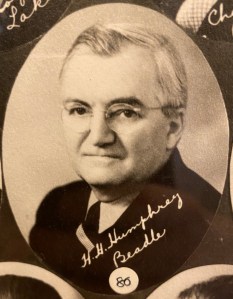
Hubert H. Humphrey Jr. is a well-known figure in American history. The liberal Minnesota icon first gained national prominence when, as mayor of Minneapolis, he successfully advocated for a civil rights plank at the 1948 Democratic National Convention. That same year, he was elected to the U.S. Senate, where he became a prominent advocate for civil rights, liberal social programs, and anti-Communist foreign policy. Humphrey sought the Democratic nomination for President in 1960, losing to John F. Kennedy. After Kennedy’s assassination, Humphrey was elected Vice President in 1964 on a ticket with President Lyndon B. Johnson. Humphrey was the Democratic nominee for President in 1968, losing narrowly to Republican Richard Nixon. He returned to the U.S. Senate in 1970, serving until his death in 1978.
Despite being among Minnesota’s favorite sons, though, Humphrey was not a native Minnesotan. He was born in Wallace, South Dakota (in Codington County) in 1911, and spent much of his early years in Doland, South Dakota, where his father, a pharmacist, ran a drug store. The family later moved to the larger town of Huron, where the Humphrey Drug sign can still be found on one of the storefronts in the central business district.
Vice President Humphrey inherited his love of politics and his Democratic affiliation from his father, Hubert H. Humphrey Sr. (his mother, Christine, was a Republican). Arnold A. Offner, in his biography of Vice President Humphrey, wrote of his father:
Politics coursed through the blood of HH [as the elder Humphrey was known], who began as a Republican but, after hearing William Jennings Bryan speak, became a Democrat and later strongly supported Woodrow Wilson, Al Smith (despite his “wetness” during the Prohibition era), and, especially, Franklin Roosevelt. Although HH was almost the lone Democrat in his community, he won election to the town council and later became mayor, vociferously if unsuccessfully arguing against the sale of Doland’s public power plant to a private enterprise in 1923. He attended the Democratic national convention in Houston as a Smith delegate in 1928 and was elected to the South Dakota legislature in 1936, with a run for governor in the offing.
Humphrey Sr. served a single term in the South Dakota House of Representatives, from Beadle County, in 1937-38. As Offner explains, the elder Humphrey’s ambition to run for governor ultimately gave way to support of his son’s ambitions. The younger Humphrey, recently married to Muriel Buck, was unhappy working in his father’s pharmacy:
[I]n August 1937, Hubert told his father that he could no longer “peddle pills,” which led to a family debate over whether to give priority to young Hubert’s future education or HH’s prospective run for governor. Christine sided with her son, and Frances [a sister] sided with her father, who offered Hubert full partnership in the drugstore, but to no avail. HH set aside his political ambitions, and the next month he and Christine drove Hubert and Muriel, with the six hundred dollars she had saved, to the University of Minnesota for the start of the fall term.
Thus ended the brief political run of the Humphreys in South Dakota, and began their political legacy in Minnesota. The elder Humphrey’s decision to forego a gubernatorial candidacy was probably a good one. Amidst the Great Depression, South Dakota had turned sharply Democratic in the early 1930s, electing Democrat Tom Berry as governor in 1932 and 1934 and supporting FDR for President in 1932 and 1936. By 1938, though, the state was returning to its Republican roots. Governor Berry had lost a close reelection battle in 1936 to Republican Leslie Jensen. In 1938, Jensen ran for U.S. Senate and, Republican Harlan Bushfield was elected governor, defeating Miner County farmer and legislator Oscar Fosheim. It would be twenty years before another Democrat, Ralph Herseth, would be elected governor, in 1958.
As recounted above, Hubert H. Humphrey Jr. became a titan of Minnesota politics. After his death in 1978, his wife Muriel would briefly serve in the U.S. Senate. Their son, Hubert H. “Skip” Humphrey III, served ten years in the Minnesota State Senate and sixteen years as Attorney General of Minnesota. He unsuccessfully sought the U.S. Senate seat previously held by his father and mother in 1990, and was the Democratic nominee for Governor in 1998.

